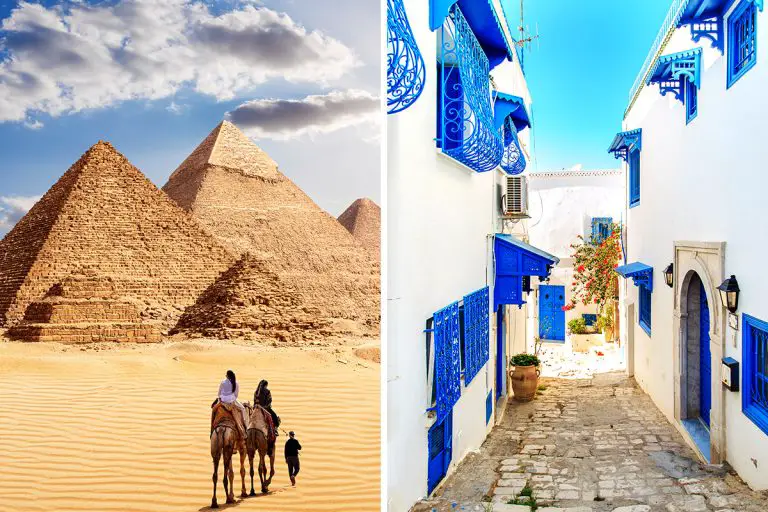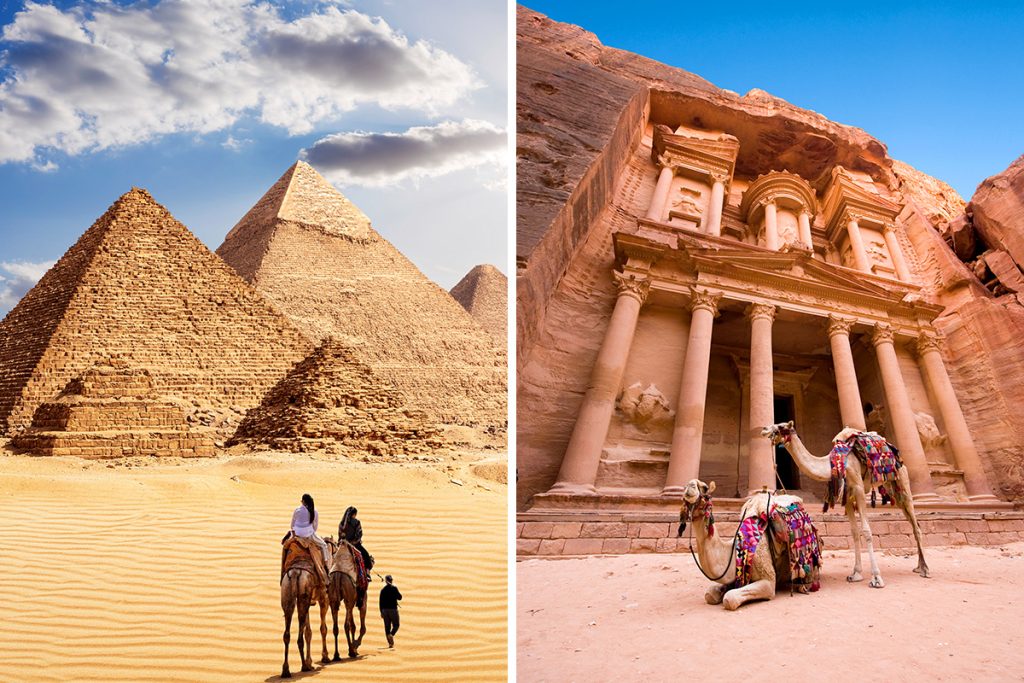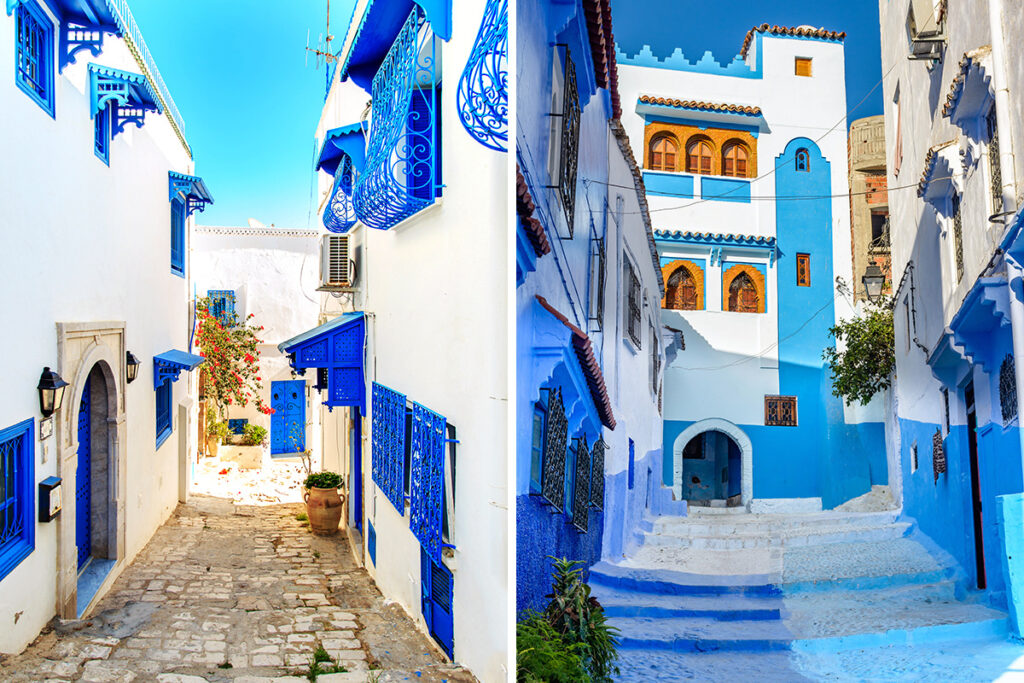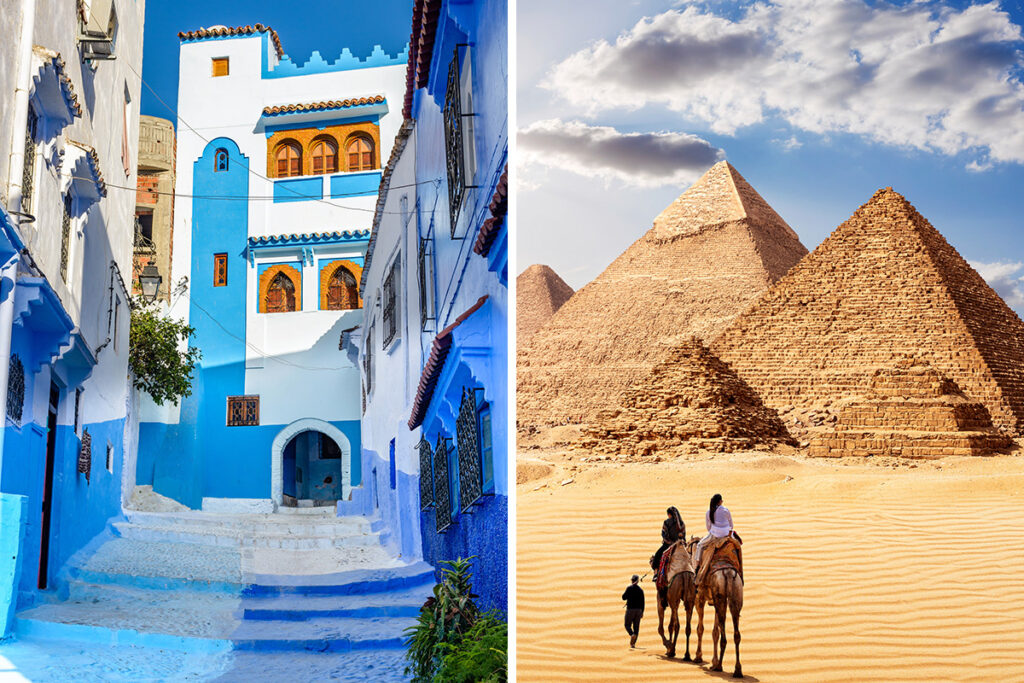You’re about to embark on a journey of comparison, delving into the characteristics that make each country special. Will it be the allure of Egypt’s ancient civilization, or will the appeal of Tunisia’s rich history and diverse culture win your heart? Stick with us, and we’ll help you uncover what lies beneath the surface of these two fascinating North African nations.
History & Culture
Picturing yourself standing in the shadows of towering pyramids, or wandering through narrow alleys of a bustling medina? That’s the power of Egypt’s and Tunisia’s deep-rooted history and vibrant cultures. Both countries have shaped the course of history in their own unique ways.
Egypt’s civilization, one of the oldest in the world, has left a lasting legacy that still captivates the modern world. It’s where pharaohs ruled, monuments were erected, and a culture was forged that has influenced societies far beyond its borders. Every corner of Egypt whispers tales from the past, creating a magical atmosphere that’s truly unmatched.
On the other hand, Tunisia boasts a rich tapestry of cultures. Having been a crossroads of civilizations, it’s a place where Berber, Arab, Ottoman, and French influences merge together to create a captivating blend. Its history is marked by ancient Carthage, a major power of the ancient world, making it a dream destination for history enthusiasts.
What’s more, Tunisia’s culture is just as rich as its history. Its customs and traditions reflect the country’s diverse heritage, creating a vibrant cultural scene that’s both unique and enthralling.
In summary, if you’re drawn to ancient civilizations and want to walk in the footsteps of pharaohs, Egypt offers a truly mesmerizing historical journey. But if a fusion of diverse cultures and histories appeals more, then Tunisia’s rich heritage and cultural diversity might just tip the scales in its favor. The choice, as always, is yours!
Attractions & Activities
Imagine yourself exploring a treasure trove of attractions and activities in both Egypt and Tunisia. Each of these fascinating destinations offers you a unique set of experiences, from awe-inspiring historical sites to thrilling outdoor adventures.
In Egypt, your journey begins with the iconic Pyramids of Giza, where you can step back in time and marvel at these ancient wonders. From there, you might want to venture into the heart of Cairo, to explore the Egyptian Museum, home to a vast array of artifacts from Egypt’s fascinating history.
If outdoor adventures appeal to your spirit, consider a trip into the Western Desert, where you can embark on a safari and experience the striking beauty of the white and black deserts.
Meanwhile, Tunisia offers a different yet equally captivating set of attractions. Begin your exploration in the ancient ruins of Carthage, where you can walk through history in this one-time rival to Rome. Following that, a trip to the Medina of Tunis, a UNESCO World Heritage Site, offers a maze of narrow streets and beautiful architecture to explore.
If nature calls to you, the Ichkeul National Park provides a sanctuary for migratory birds and a myriad of other wildlife.
In summary, Egypt offers a journey into the annals of ancient history, while Tunisia blends cultural heritage with natural beauty. Your preferences will guide your choice – whether it’s the allure of Egypt’s historical wonders or the charm of Tunisia’s diverse attractions.
Beaches
Sun, sea, and sand – are you picturing yourself lounging on a beach with a mesmerizing view of the water? Egypt and Tunisia, with their extensive coastlines, offer several stunning beaches that could cater to your needs.
Egypt’s coastal gem, Sharm El Sheikh, located on the southern tip of the Sinai Peninsula, is a haven for those seeking tranquility by the Red Sea. The soft sands stretch for nearly 60 kilometers (about 37 miles), and the clear, turquoise waters are perfect for a refreshing dip.
Contrastingly, Tunisia boasts some of the Mediterranean’s best beaches. Hammamet, in particular, is a delight, with its golden sands extending over 20 kilometers (around 12 miles) and calm azure waters that invite you for a leisurely swim.
In conclusion, if a Red Sea beach experience excites you, Egypt’s Sharm El Sheikh may be the perfect fit. But if you’re seeking Mediterranean charm, Tunisia’s Hammamet Beach could be your ideal choice. Your dream beach experience awaits you in either country!
Eating, Drinking & Nightlife
Imagine tantalizing your taste buds with a variety of unique flavors while enjoying the vibrant nightlife in Egypt and Tunisia. Both of these countries offer a rich culinary scene and a lively evening atmosphere.
In Egypt, your culinary adventure begins with koshari, a delicious mix of rice, pasta, lentils, and chickpeas, topped with a spicy tomato sauce and crispy onions. Don’t miss out on ful medames, a slow-cooked fava bean dish, commonly served with bread for breakfast.
Now, onto the drinks. Egyptian tea, served in small glass cups, is a favorite among the locals. It’s usually strong and sweetened to taste. You might also like to try the traditional Egyptian coffee, known as “ahwa”.
On the other hand, Tunisia offers dishes like couscous with lamb or fish, a staple in the Tunisian diet. For a spicy twist, try shakshuka, a dish of eggs poached in a sauce of tomatoes, chili peppers, and onions.
As for beverages, mint tea is a popular choice, often served with pine nuts for a unique flavor. Boukha, a fruit brandy made from figs, is a traditional Tunisian drink you might like to try.
Nightlife in both countries varies. In Egypt, Cairo’s nightlife is buzzing, with a range of traditional music shows, belly dancing performances, and modern clubs. Meanwhile, Tunisia’s nightlife is more concentrated in its coastal resorts, where you’ll find a mix of lively bars, beach clubs, and discos.
In conclusion, whether it’s the hearty Egyptian koshari and vibrant Cairo nights, or Tunisian couscous and coastal resort parties, each country offers a distinctive culinary and nightlife experience tailored to your preferences.
Shopping
Picture yourself wandering through bustling markets, exploring unique shops, and discovering a variety of local products in both Egypt and Tunisia.
In Egypt, you’ll find bazaars like Khan El Khalili in Cairo, where you can shop for traditional items such as handmade carpets, jewelry, spices, and perfume oils. Ceramics and papyrus artworks are also quite popular. The vibrant atmosphere and the endless array of goods make shopping here a unique experience.
Meanwhile, Tunisia offers you equally interesting shopping experiences. The Souk in Tunis, for example, is a maze of narrow alleyways lined with shops selling traditional Tunisian items. Here, you can find beautiful ceramics, textiles, and silver jewelry. Leather goods are also a popular purchase in Tunisia.
To wrap it up, whether you’re in search of Egypt’s papyrus art and spices or intrigued by Tunisia’s ceramics and textiles, both countries offer a shopping experience that promises a treasure trove of unique souvenirs and gifts. Your adventure awaits!
Accommodation
Choosing the perfect accommodation can significantly enhance your travel experience. Both Egypt and Tunisia offer a wide range of options that cater to different tastes and budgets.
In Egypt, from the posh hotels overlooking the Nile in Cairo to the all-inclusive resorts in Sharm El Sheikh, there’s something for every type of traveler. You’ll also find budget-friendly guesthouses and hostels that offer a more local experience. Remember to explore the charming Dahab, known for its budget-friendly accommodations and diving centers.
Contrarily, Tunisia’s accommodation options range from luxurious beachfront resorts in Djerba to traditional guesthouses, known as “dars”, in the heart of Tunis. If you’re on a budget, don’t fret. Tunisia also has a selection of affordable youth hostels and budget hotels that don’t skimp on comfort.
To sum it up, both Egypt and Tunisia cater to a spectrum of preferences and budgets when it comes to accommodation. Whether you desire a luxurious resort or a budget-friendly hostel, you’ll find a place that feels like a home away from home.
Family-Friendliness & Children’s Activities
When it comes to family-friendly destinations, both Egypt and Tunisia are top choices. Each country offers a multitude of activities that are sure to keep the younger ones entertained.
Egypt is filled with family-friendly activities. A visit to the Giza Pyramids and the Egyptian Museum in Cairo is a great educational experience for kids. You could also take a family-friendly cruise on the Nile, or have fun exploring the underwater world while snorkeling in the Red Sea.
On the other hand, Tunisia also boasts a plethora of kid-friendly attractions. The Carthage ruins and the Bardo Museum can provide a fun, educational experience. Plus, the beautiful sandy beaches in Djerba are perfect for building sandcastles and the Djerba Explore Park is a hit among the younger crowd.
In conclusion, whether it’s exploring ancient history in Egypt or enjoying the sandy beaches in Tunisia, both countries ensure a memorable and fun-filled vacation for your family.
Getting There & Getting Around
Before setting off on your adventure to Egypt or Tunisia, it’s important to know the best ways to get there and get around.
Most international flights to Egypt land at Cairo International Airport. From the United States, direct flights take about 12 hours (7,614 miles or 12,250 kilometers).
Once you land, getting around is a breeze. Taxis and ride-sharing services like Uber are available in major cities. For long distances, trains are a comfortable and scenic option, especially along the Nile.
For Tunisia, most international travelers will arrive at Tunis-Carthage International Airport. Direct flights from the United States can take around 11 hours (5,000 miles or 8,000 kilometers).
Once you’re there, taxis are plentiful and affordable, and buses serve as a cheaper alternative for getting around the cities. If you plan to travel between cities, trains and “louages” (shared taxis) are your best bet.
In a nutshell, whether you’re navigating the bustling streets of Cairo or exploring the historic lanes of Tunis, both Egypt and Tunisia offer a variety of convenient transportation options to ensure your journey is smooth.
Weather
Your holiday experience can often hinge on the weather. That’s why understanding the climate of Egypt and Tunisia is crucial.
In Egypt, the weather is generally hot and sunny throughout the year. In the summer months (June to August), the average temperatures hover around 95°F (35°C). However, in the winter months (December to February), you can expect a cooler climate, with temperatures averaging around 68°F (20°C).
Tunisia, on the other hand, enjoys a Mediterranean climate. The summer months are hot and dry, with temperatures reaching up to 86°F (30°C). The winters are mild and slightly rainy, with average temperatures dropping to around 60°F (16°C).
In a nutshell, if you’re seeking constant sunshine and don’t mind high temperatures, Egypt would be your go-to. For those preferring milder weather with a bit of rain in winter, Tunisia would be a better choice.
Safety
Safety is a key consideration when planning your trip. Let’s look at what Egypt and Tunisia have to offer in this aspect.
Egypt is generally safe for tourists, with police and military presence especially prominent in tourist areas. That said, like any other travel destination, you should stay alert to your surroundings, especially in crowded places.
Tunisia, too, is considered safe for tourists. The country has made substantial efforts to bolster safety since 2015, significantly enhancing security in tourist areas. Nevertheless, staying vigilant, particularly in crowded areas, is always a good idea.
In terms of health safety, both countries recommend routine vaccines for travelers. It’s also important to note that tap water in both Egypt and Tunisia is not typically safe to drink, so it’s best to stick to bottled water.
In conclusion, both Egypt and Tunisia place a high emphasis on tourist safety. Regardless, it’s always wise to keep your wits about you, just like you would at home.
Cost
Whether you’re on a budget or ready to splurge, knowing the cost of living in your destination can help you plan better.
Egypt is generally more budget-friendly. For instance, a meal at an inexpensive restaurant costs around 100 Egyptian Pounds ($6). Conversely, in Tunisia, you might spend around 10 Tunisian Dinars ($3.6) for a similar meal.
Accommodation costs also differ. A one-night stay at a mid-range hotel in Egypt could cost you around 700 Egyptian Pounds ($45), while in Tunisia, a similar hotel might set you back around 120 Tunisian Dinars ($43).
To sum up, both Egypt and Tunisia offer affordable travel options. However, if budget is a concern, Egypt tends to be a bit cheaper, while Tunisia might require a slightly higher budget.
Which Is Better – Egypt or Tunisia?
If you’re dreaming of a North African adventure, you might be torn between two amazing destinations: Egypt and Tunisia. Both countries offer stunning landscapes, ancient wonders, and cultural diversity, but they also have distinct features that make them stand out. Read on to find out which country matches your travel goals and expectations better.
Diving into the history and culture of these North African gems, it’s evident that both Egypt and Tunisia hold their unique appeal. Egypt’s pharaohs, pyramids, and Sphinx have fascinated the world for centuries. Tunisia, however, offers a rich tapestry of Berber, Roman, and Islamic history, revealed in its well-preserved ancient ruins and vibrant medinas.
If you’re a history buff or an archaeology enthusiast, Egypt’s vast and ancient heritage might hold a stronger appeal, while Tunisia would be ideal if you’re intrigued by a blend of different cultures.
Exploring the attractions and activities, Egypt boasts iconic landmarks such as the Pyramids of Giza and the Valley of the Kings. Tunisia, on the other hand, offers unique experiences like wandering through the maze-like medinas and relaxing in traditional hammams.
If your idea of a perfect vacation involves iconic, bucket-list landmarks, then Egypt is your destination. However, if you seek a more off-the-beaten-path experience, you might find Tunisia more appealing.
In terms of beaches, Egypt’s Red Sea Riviera is a haven for divers and snorkelers, while Tunisia’s Mediterranean coastline is perfect for those looking for sandy beaches and clear waters. If water sports and coral reefs excite you, then Egypt is your go-to. If relaxing on sandy beaches is your preference, then Tunisia is a better choice.
When it comes to eating, drinking, and nightlife, both countries offer a plethora of local flavors and vibrant nightlife. However, if you’re into spicy food and bustling nightlife, Tunisia’s harissa and beachfront clubs might be more to your taste. Egypt offers a range of flavors and an exciting nightlife scene, particularly in Cairo.
Considering accommodation and family-friendliness, both Egypt and Tunisia offer a variety of accommodations suitable for every budget and a range of activities for families. If you’re traveling with kids, Tunisia’s beach resorts with their dedicated kids’ clubs might be a better fit.
When looking at the ease of getting there and around, both countries are well-connected internationally. Tunisia has a more efficient public transport system, making it easier for you to navigate the country. Meanwhile, Egypt offers more flights from major international cities.
Considering weather, safety, and cost, Egypt’s year-round sunny weather, safety measures for tourists, and affordable living costs make it a great choice. Tunisia also boasts a safe environment for tourists, along with a mild Mediterranean climate and reasonable prices.
In conclusion, both Egypt and Tunisia are remarkable travel destinations, each with its own allure. Your choice depends on your personal preferences. Whether you’re attracted to Egypt’s ancient monuments and sunny weather or Tunisia’s cultural blend and Mediterranean beaches, you’re in for an unforgettable journey.




